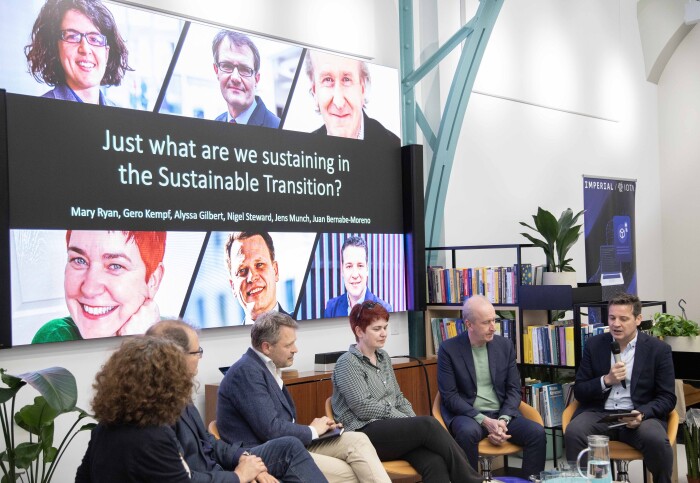Imperial launches iCUBE lab to pioneer circular economy research

Digital tools developed in a new laboratory will help the UK redefine economic models to combat wasteful resource use and environmental damage.
The iCUBE lab, inaugurated on July 3rd, represents a pivotal move for Imperial towards fostering sustainability through innovative technologies. Positioned within the iCUBE facility in the Dyson School for Design Engineering at Imperial College London, the I3-Lab (Imperial IOTA Infrastructure Lab) focuses on pioneering digital instruments that support the circular economy.
This initiative, which is supported by a £1m donation by the IOTA Foundation, aims to redefine and support new circular economic models.
What is the circular economy?
Central to its mission, the I3-Lab focuses on the creation and use of digital instruments that will empower the circular economy.
Conventional business models rely on resource consumption to produce economic growth, i.e. to create more economic growth, they use more of our planet’s finite resources. Over the twentieth century, the drive for growth has resulted in unsustainable business practices.
The circular economy aims to decouple this relationship by focusing on sustainability through reuse and recycling. This shift requires new production methods and technologies that promote sustainability.
Distributed ledger technology developed at the lab is already being used in several projects that innovate new economic models, where it is helping to promote sustainability in projects such as the Trade Logistics Information Pipeline (TLIP) and Digital Product Passports.
The IOTA Foundation, which is supporting the new lab, is a non-profit foundation developing ‘next generation protocols for the connected world’, with a commitment to sustainable impact.
How can digital technologies help?
 A unique feature of I3-Lab is its aim to develop technologies supporting new ownership models and business models based on servitization. The vision is for these models to facilitate sharing and on-demand access to goods, services and materials, moving away from conventional sole ownership.
A unique feature of I3-Lab is its aim to develop technologies supporting new ownership models and business models based on servitization. The vision is for these models to facilitate sharing and on-demand access to goods, services and materials, moving away from conventional sole ownership.
What’s happening at the I3-Lab?
The I3-Lab is already making significant strides, having secured two additional grants and funding for Autofair, a Horizon Europe project for fair AI algorithms, iCircular3, a project that studies circularity in the contexts of robotics, automobiles and outdoor tools.
The I3-Lab has hired five PhD students and several senior researchers, with the goal of a total team of about 25 people.
The lab is based in the Royal College of Science building at Imperial’s South Kensington Campus. This Victorian building, which has housed scientific laboratories for over 100 years has now been meticulously restored, adding a touch of historic charm to the cutting-edge research facility.
The Foundation’s Applied Research Team will be working and exchanging knowledge with the projects involved with the I3-Lab, led by Dr William Sanders, IOTA’s Director of Applied Research, who is now a visiting researcher at Imperial.
Reflections on the Circular Economy
During the I3-Lab launch event, a panel discussion with experts from academia, industry, and policy sectors asked “Just what precisely are we sustaining in the Sustainable Transition?". Moderated by Juan Bernabe Moreno of IBM Research UK & Ireland, the panel explored the critical role of the circular economy in achieving environmental sustainability and economic resilience.
We need to change how we design products to accommodate recycling and end-of-life considerations Mary Ryan Mary Ryan Vice Provost for Research and Enterprise at Imperial College London
The discussion highlighted diverse perspectives on sustainability challenges and solutions, including technological innovations, policy frameworks, and consumer behaviour. Professor Mary Ryan, Vice Provost for Research and Enterprise at Imperial, highlighted the need to redesign product lifecycles to enhance recycling capabilities.
Other panellists contributed their insights on sustainability. Alyssa Gilbert, Director of Innovation at the Grantham Institute - Climate Change and the Environment, stressed the importance of effective communication and innovation in promoting sustainability. "Most policymakers are not scientists, yet sustainability impacts economic development and quality of life," Ms Gilbert noted, highlighting the necessity for clear messaging to engage policymakers and the public.
Jens Munch Lund-Nielsen, Head of Trade & Supply Chains at the IOTA Foundation, addressed critical challenges in sustainability, focusing on carbon repositioning and the transition from product-centric to service-based models. "Two main things: carbon and materials. Repositioning carbon is essential," they emphasised.
The event concluded with a consensus on the imperative of accelerating innovation and scaling sustainable practices to address global environmental challenges effectively.
IOTA and Imperial

I3-Lab marks the latest development in the relationship between the IOTA Foundation and Imperial. IOTA has previously funded grant work for Imperial’s Professor Robert Shorten, with Dr Pietro Ferraro, now part of the IOTA team, having participated in this grant as a postdoc, contributing to the development of the IOTA Congestion Control algorithm and co-authoring several publications on IOTA.
Looking ahead, the I3-Lab plans to expand its research agenda, attract top talent, and forge new partnerships. Its historic setting combines heritage with modern research facilities, inspiring pioneering research. As the lab continues to publish findings and demonstrate real-world applications, it aims to shape global conversations and inspire transformative change towards a sustainable future.
Article text (excluding photos or graphics) © Imperial College London.
Photos and graphics subject to third party copyright used with permission or © Imperial College London.
Reporter
Sanjana Kakar
Department of Materials